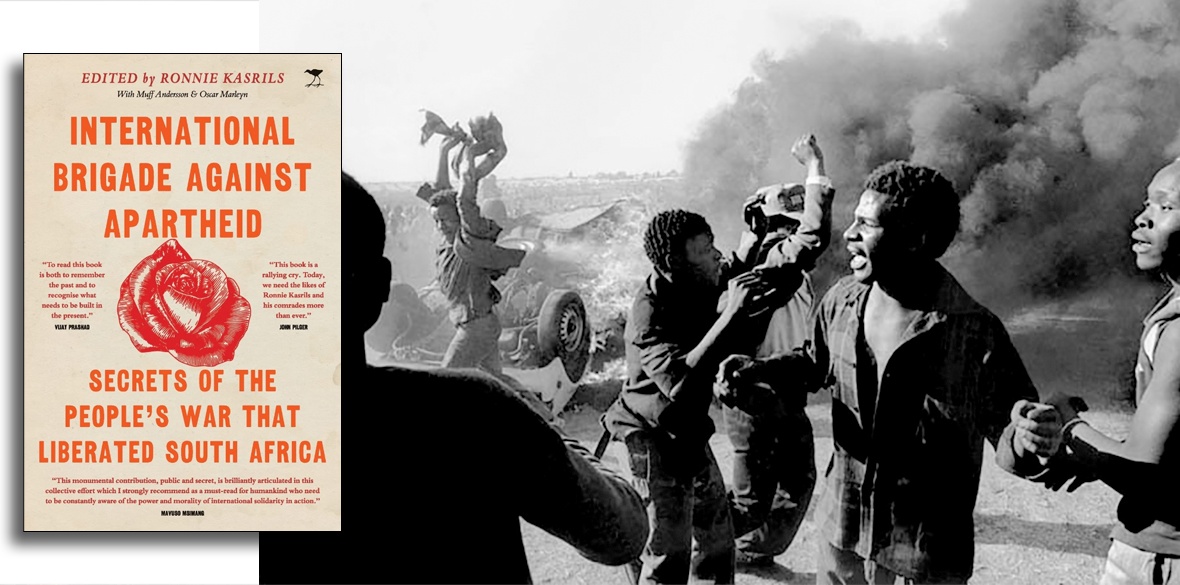This is the last article you can read this month
You can read more article this month
You can read more articles this month
Sorry your limit is up for this month
Reset on:
Please help support the Morning Star by subscribing here
International Brigade Against Apartheid: Secrets of the People’s War That Liberated South Africa
Edited by Ronnie Kasrils with Muff Andersson and Oscar Marleyn
Jacanda Media £16.95
THIS extraordinary book brings together an amazing range of inspiring stories of international solidarity.
This was the unshakeable bedrock of the struggle, in the words of ANC leader Oliver Tambo, international solidarity that so firmly rejected apartheid and race oppression.
This was solidarity as an act of unity between allies, part of wider struggles for “liberation in every continent where humanity yearns for justice, freedom, equality and a safe, eco-friendly world.”
As Ronnie Kasrils, retired struggle veteran and former government minister, explains, the title of this remarkable book consists of two independent entities: open advocacy entailing peaceful active solidarity; the other clandestine and linked to armed struggle.
Between them these sections offer a range of different accounts. But each contributes to the overall struggle, in their own way according to their own particular abilities and circumstances, the internationals who worked underground within apartheid South Africa and the internationals in the front-line states who provided them with essential back up, the anti-apartheid activists across the globe and those who supported them from within governments and the UN.
One of the particularly striking features of the book is its emphasis on the roles of Black Internationals. Their extraordinary contributions have been relatively less well recognised in the past. But this was teamwork of the highest order. White and Black Internationals were mutually interdependent, even if they couldn’t actually meet in person, for reasons of security.
The dangers were ever present, both inside South Africa and outside its borders, in the front-line states where black and white activists both risked being murdered by the forces of the apartheid state.
Part one goes on to provide 34 accounts of amazing courage and determination. Some of these stories may already be familiar to Morning Star readers, such as those of the London Recruits, who went into South Africa to support the African National Congress from the 1970s.
Some ended up in South African prisons as a result. Others were more fortunate, though, including those who organised the African Hinterland project, carrying weapons under a safari tourist vehicle travelling overland to South Africa.
There are so many lesser-known stories of heroism as well, people who risked their lives and liberties in solidarity with the struggle.
Part two moves on to explore the contributions of the Anti-Apartheid Movement in Britain and a number of other countries. Campaigns to Stop the Sports Tours grabbed the headlines in 1970. Other may be less familiar.
Most significant was the continuing support from the USSR and from the German Democratic Republic (which provided education and training). There was support from Cuba, including militarily defeating apartheid armies invading Angola at Cuito Cuanavale in 1988 and described as the turning point of the struggle.
Looking back on these experiences, activists reflect on the situation in South Africa today. There have been improvements in housing, health and education but a local elite with the assistance of the private sector has been creaming off a large slice of the country’s wealth through contract fixing, downright fraud and money laundering, says Oscar Marleyn.
But democratisation is, adds Marleyn an “ongoing process in which citizens are continuously mobilised to maintain and realise their economic and political rights.
“So were my efforts worth it?” he asks. “Well, I’m waiting to see. I’m a patient man.”
In the epilogue Ronnie Kasrils asks himself the same question: “was it all worthwhile?” He recognises the stench of corruption under Jacob Zuma’s crony capitalism along with widening inequality.
But the demise of apartheid was a turning point, not an end in itself in his view. It opened the way for the next stage of struggle and, as he concludes, the example of international solidarity is a powerful inspirational force for the future.
This book is a must for Morning Star readers, an inspiration for us all, and especially so for the next generation. A luta continua!












